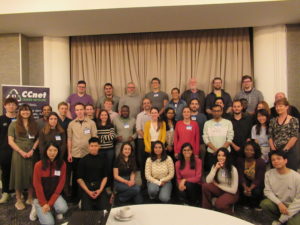Our first workshop “Metabolic Modelling”, a 4 day residential event held at Mercure Hotel, Nottingham
Redirecting an organism’s metabolism towards novel products raises several design issues. What is the impact of the new pathway on the cell’s energy and redox metabolism? Can the precursor and coenzyme requirements be satisfied? Should some parts of the metabolic network be blocked off to ensure the most efficient routes to the product are favoured? These were some of the questions answered at the recent Carbon Recycling Network Metabolic Modelling Workshop Nottingham.
Our first workshop “Metabolic Modelling”, a 4 day residential event held at Mercure Hotel, Nottingham was oversubscribed and a great success. Course leader Mark Poolman and his team of 4 tutors offered expert tuition to a total of 36 NIBB scientists (30 from Carbon Recycling and 6 from other NIBBS).
‘Having a limited background in metabolic modelling and flux balance analysis, I felt nervous being a part of the workshop. However, it was organised in a way that participants with more advanced experience offered support. Most importantly, there were highly skilled and experienced tutors as part of the organizers who were willing to offer help all the time. This coupled with the lectures before the practical sessions made it easy to learn what was being taught. Just makes it evident that with a great team such as the one put together by the the Carbon Recycling Network, people with any degree of expertise can be trained in a desired field. I would recommend it to anyone willing to get an introduction or advance their skills in metabolic modelling.’ Bashir Rumah, Post doctoral Researcher.
‘A very intense 4 days of course was a real feat, getting everyone of differing abilities over the basics of the background mathematics, introduction to coding in python and all the way up to answering specific questions with plenty of help from the experts for those who wanted to delve deeper. Having everyone from the CRN together was great, helping each other out with practical tasks was a relaxed gateway for making new friends and collaborators. It was a nice change that all the examples applied to my work rather than having to juggle cell biology and pure heterotrophs which normally dominate that kind of workshop. A great experience overall.’ Benedict Claxton-Stevens, PhD Student.

